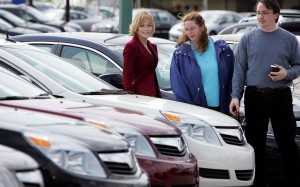
The latest U.S. new car sales forecast reflects the substantial impact the coronavirus impact will have in 2020.
With Congress debating a trillion-dollar stimulus package to help the U.S. economy weather the COVID-19 outbreak, analysts are warning the ongoing economic slowdown is now certain to sink the auto industry.
ALG, a subsidiary of the car-buying service TrueCar, updated 2020 new vehicle sales forecast to account for the “quickly evolving COVID-19 pandemic” and the latest economic outlook.
In the most “optimistic” scenario, which assumes freedom of movement is restored and the economic stimulus package takes hold by May 1, ALG’s analysts suggest new vehicle sales in 2020 would sink to 15.3 million — 2 million units less than in 2019.
(U.S. car sales verging on Great Recession-level collapse.)
In what is described as its “mixed” scenario, ALG estimates that longer periods of social distancing and order to stay at home and supply disruptions due to production shortages could cut sales to 13.2 million units even with the stimulus package having a positive impact.
ALG’s worst-case scenario noted if the social distancing and limits on out-of-home activity lasts through the summer would lead to a significant recession and higher unemployment through 2020 would reduce vehicle sales to 11.2 million units, a level last seen during the Great Recession.
“A dependable personal automobile will continue to play a critical role in daily life. Even during ‘stay at home’ orders vehicles will be used to get essential employees to work, deliver food, run critical errands and provide a safe transport in a time when public transportation is limited or unavailable,” said Eric Lyman, chief industry analyst for ALG.
“We cannot stress this enough, automotive sales will return,” said Morgan Hansen, vice president, Data Science at ALG. “The aging U.S. vehicle fleet and growth of millennial market are underlying pillars of strength in mid to long-term auto sales. Natural replacement demand remains steady at roughly 15.5 million vehicles per year. Sales below this figure are not ‘lost,’ but merely deferred until we see a return to our daily routine.”
Meanwhile, Volvo and BMW have joined the long list of carmakers that have closed plants not only in the U.S. but also Canada and Mexico.
Volvo said it will close U.S. and Swedish plants from March 26 to April 14, which includes its plant in Ridgeville, South Carolina, employing 1,500 people.

New vehicle sales could drop to Great Recession levels under ALG’s worst-case scenario: 11.2 million.
Like Volvo, BMW has one U.S. plant, in Greer, South Carolina, near Spartanburg. The facility employs 11,000 people and will close on April 2 for two weeks, the company announced last weekend.
(Q&A: J.D. Power’s Tyson Jominy offers a look at what’s ahead.)
Detroit’s three automakers, General Motors, Ford Motor Co. and FCA, have idled more than 150,000 hourly workers and the layoffs by other Asian and European carmakers and suppliers could top 1 million.
The decisions by Volvo and BMW come one day after Bridgestone announced it closing two plants in Aiken, South Carolina for up to three weeks as part of a phased shutdown of all its American plants.
“The dynamic development of the corona pandemic is having a major impact on the global demand for cars. We are therefore taking a flexible approach and adjusting our production volumes accordingly,” the company said in a statement.
The overall economic impact of the lockdowns brought on by the spread of the lethal virus, have become a major concern in Washington D.C. for both the Congress and the Trump administration, which only two weeks ago was boasting of the economy’s strength.

General Motors is offering 0% financing for some of its brands in hopes of trying to keep sales moving.
“Our public health experts, who are terrific, are studying the variation and the disease across the country and we will be using data to recommend new protocols to allow local economies to cautiously resume their activity at the appropriate time,” President Donald Trump told reporters in the White House briefing room Monday evening.
Trump said he would listen to the advice of his health experts, but it is not clear if the Trump administration could order companies to reopen for business in the face of the “shelter in place” order put in place by various states. Michigan, Ohio and Wisconsin have now joined states such as Washington, California, New York, New Jersey, Delaware and Maryland.
In addition, individual communities in states such Georgia, Florida and Texas have put shelter in place orders in place.
(Detroit automakers set to temporarily shutter North American production.)
In San Antonio, Texas, one of the state’s largest cities, Mayor Ron Nirenberg and Bexar County Judge Nelson Wolff have ordered residents to stay home through April 9, unless they are getting needed health care, getting supplies for their household or pets, going outside for exercise, or working for an entity that has been exempted from the order.

